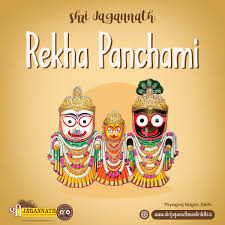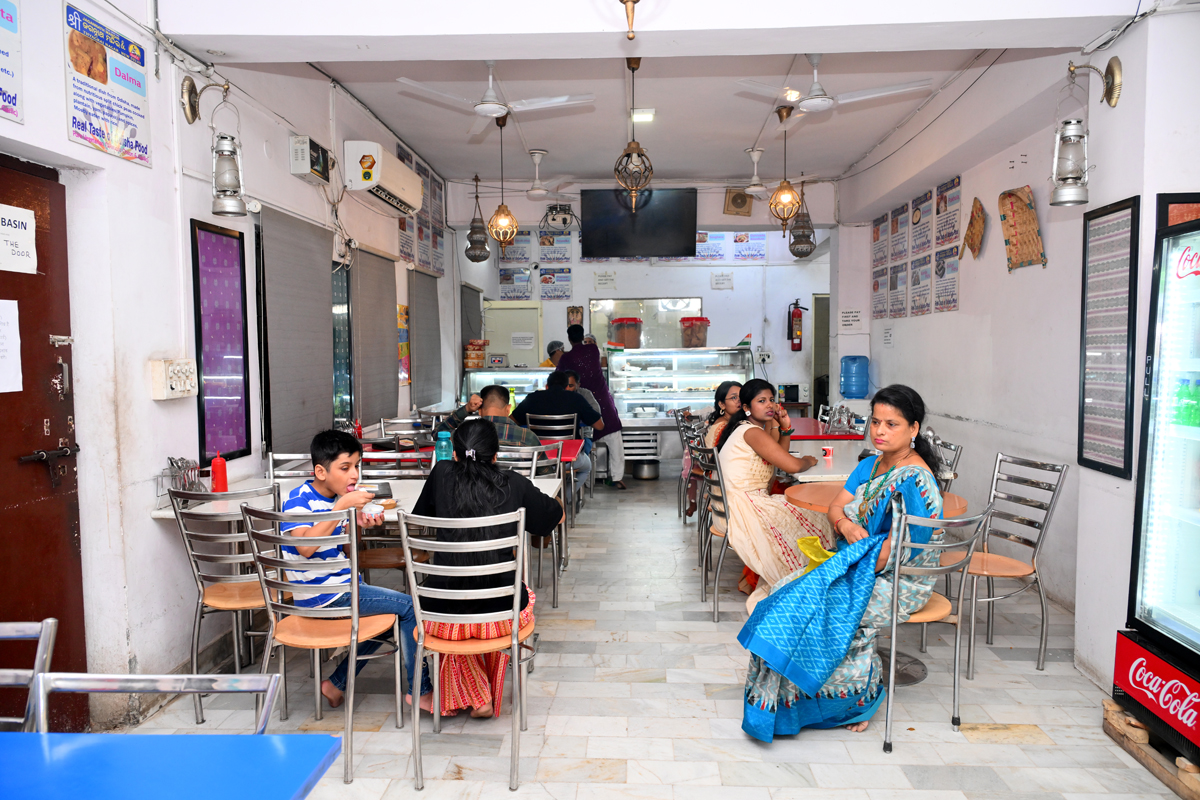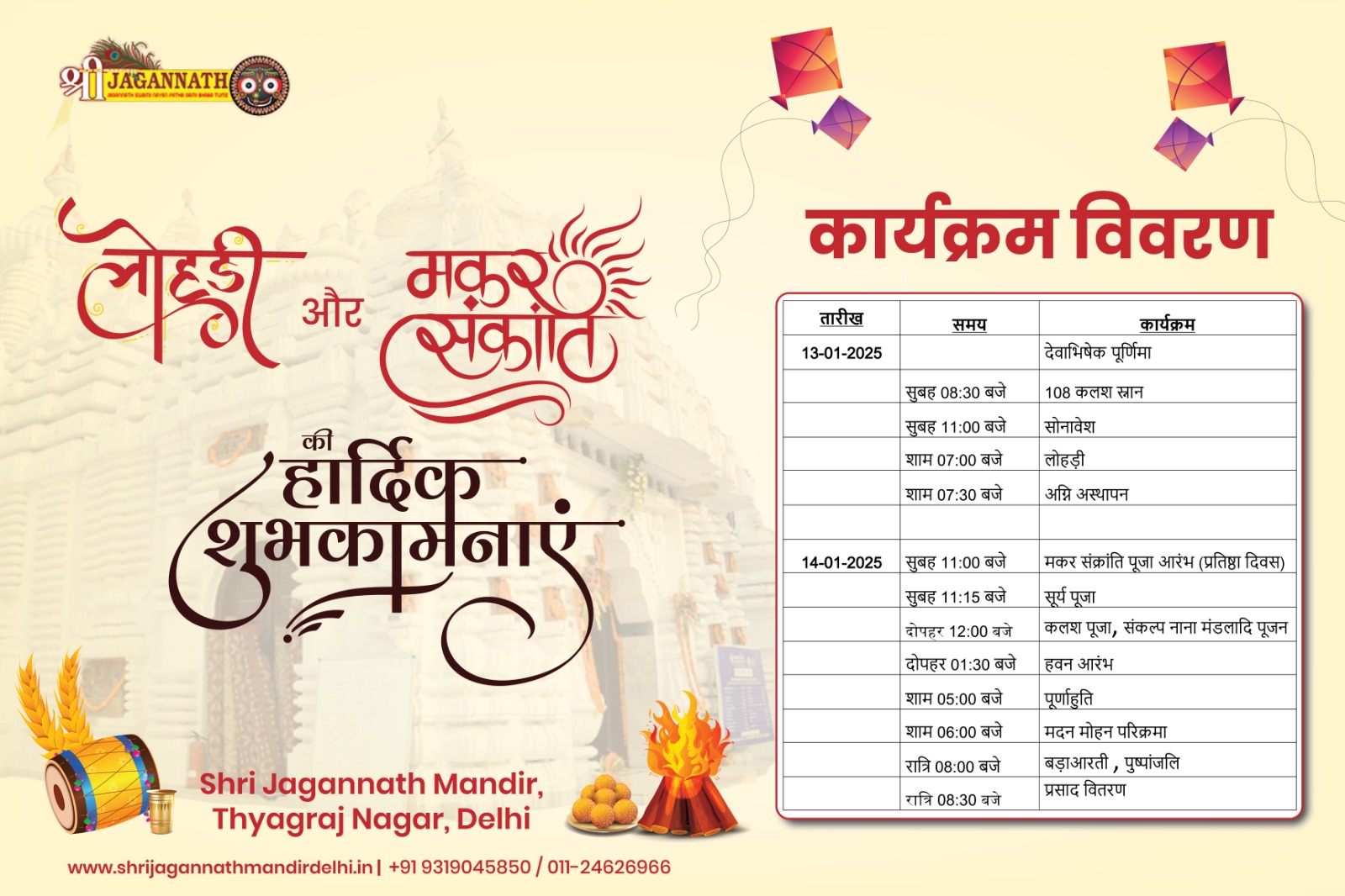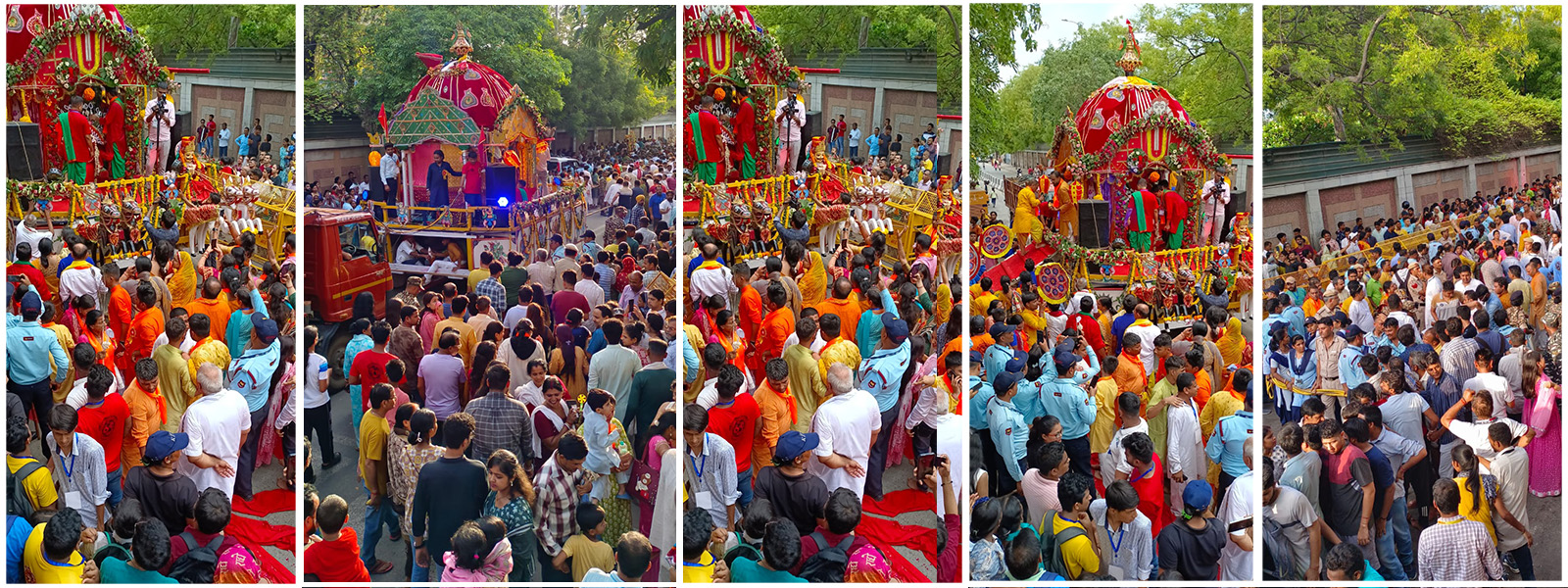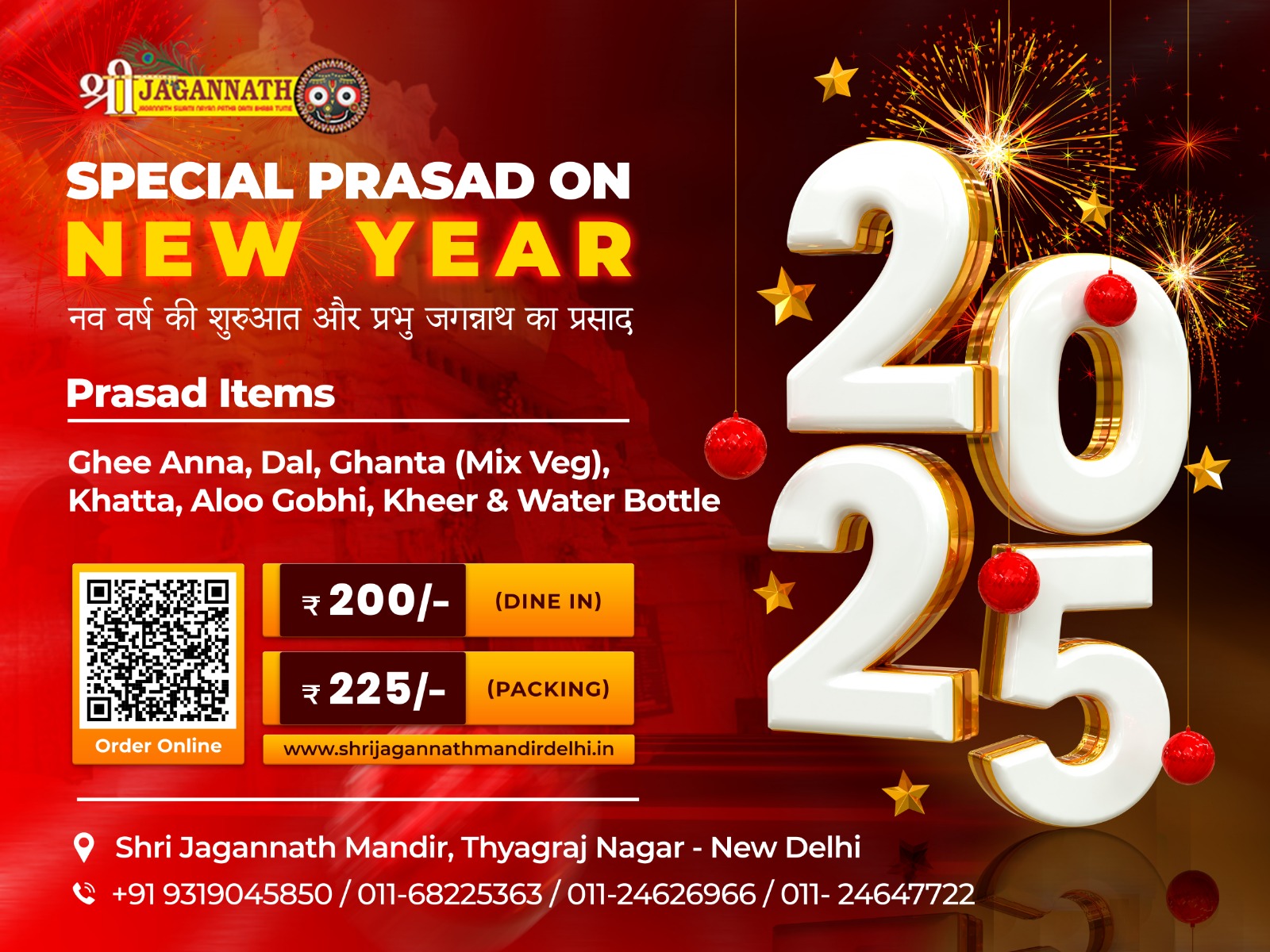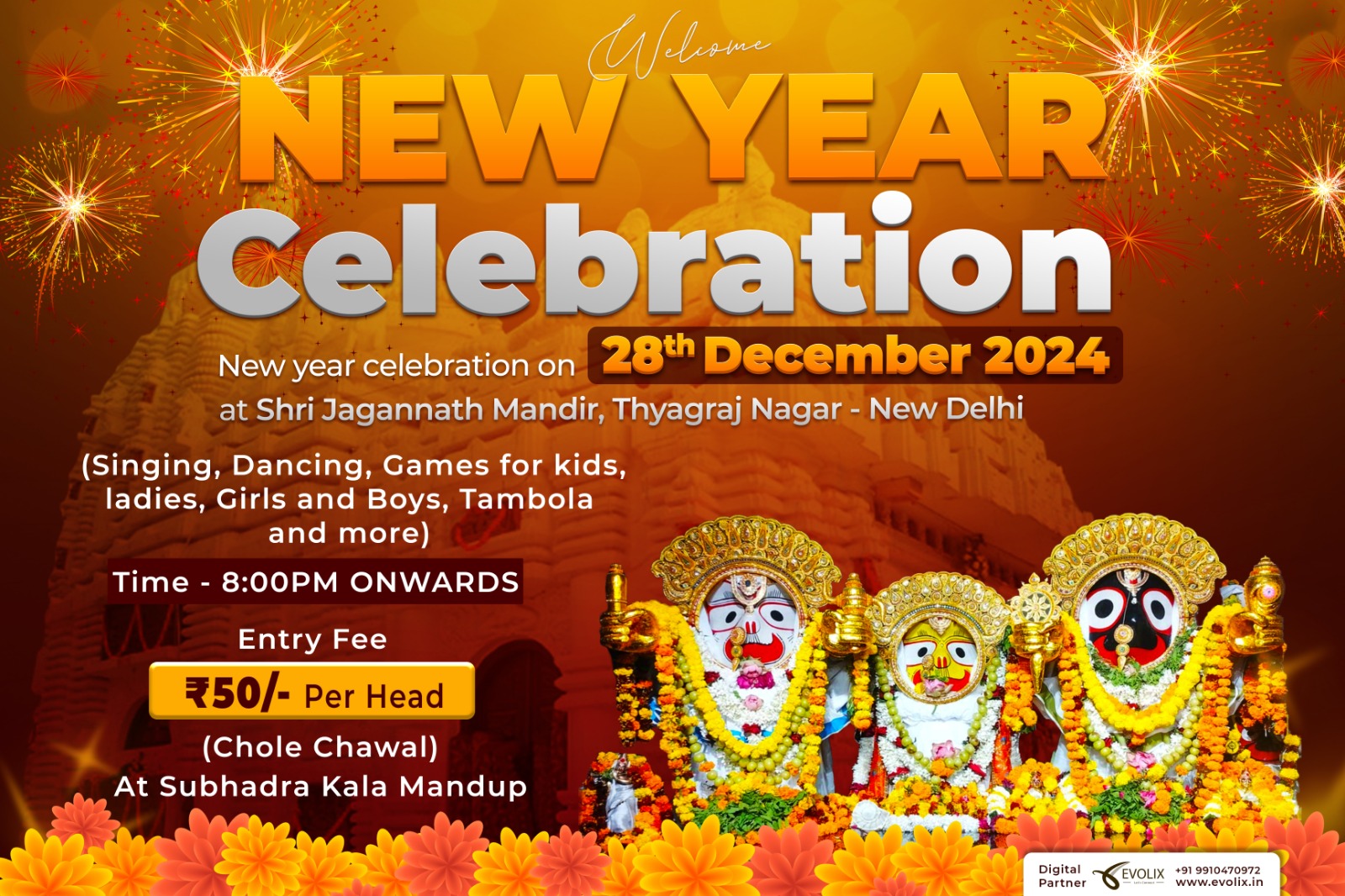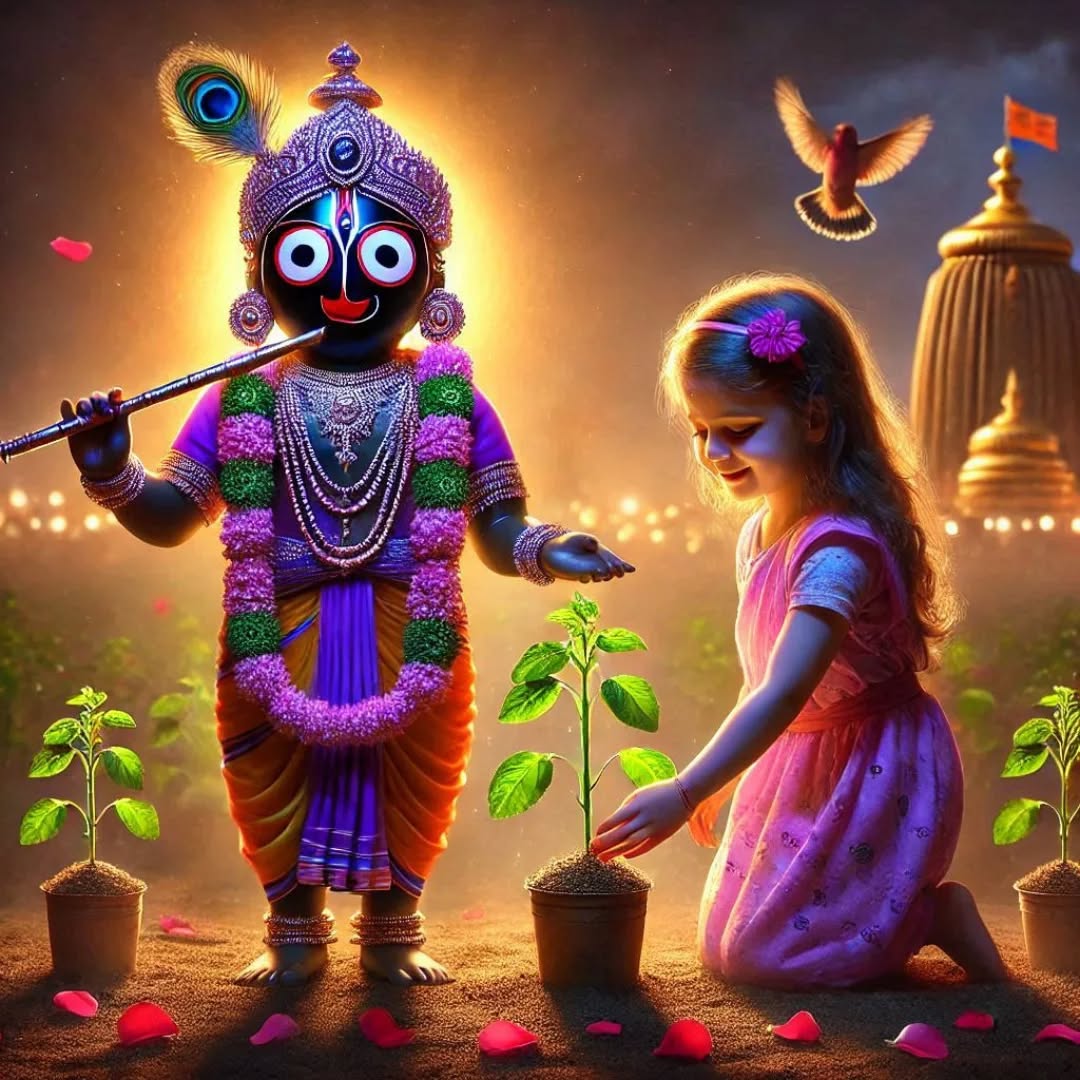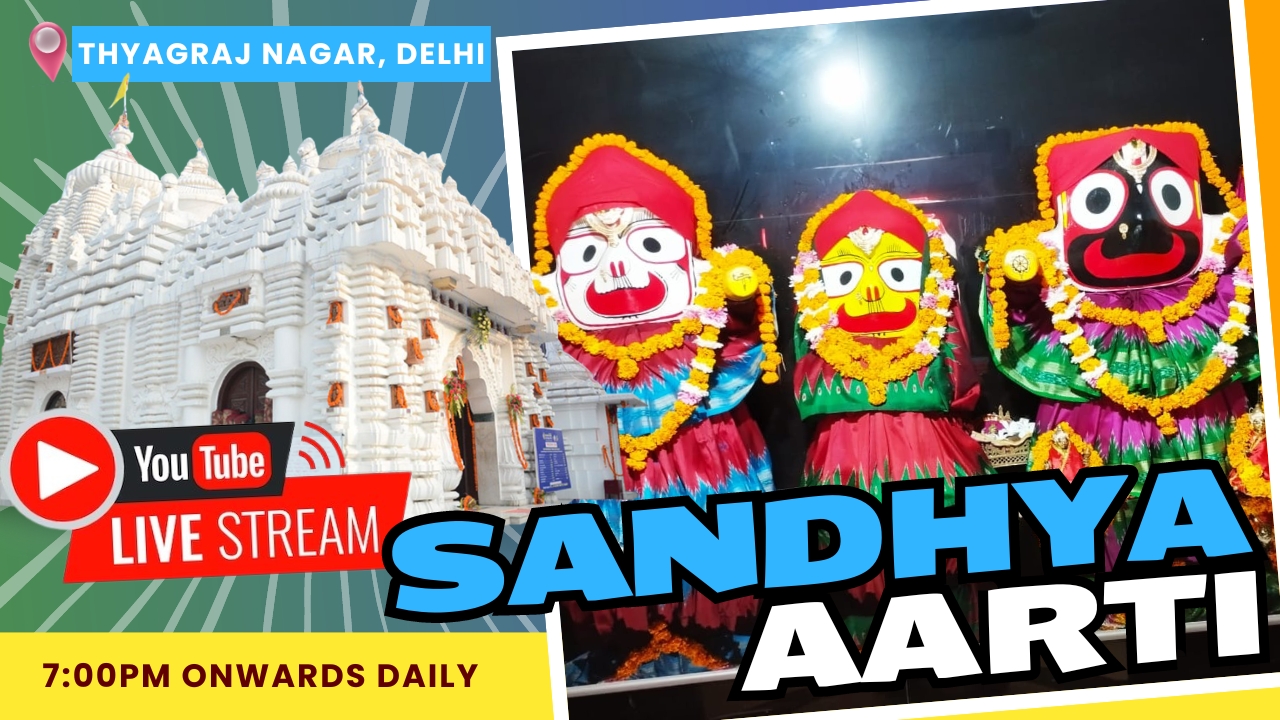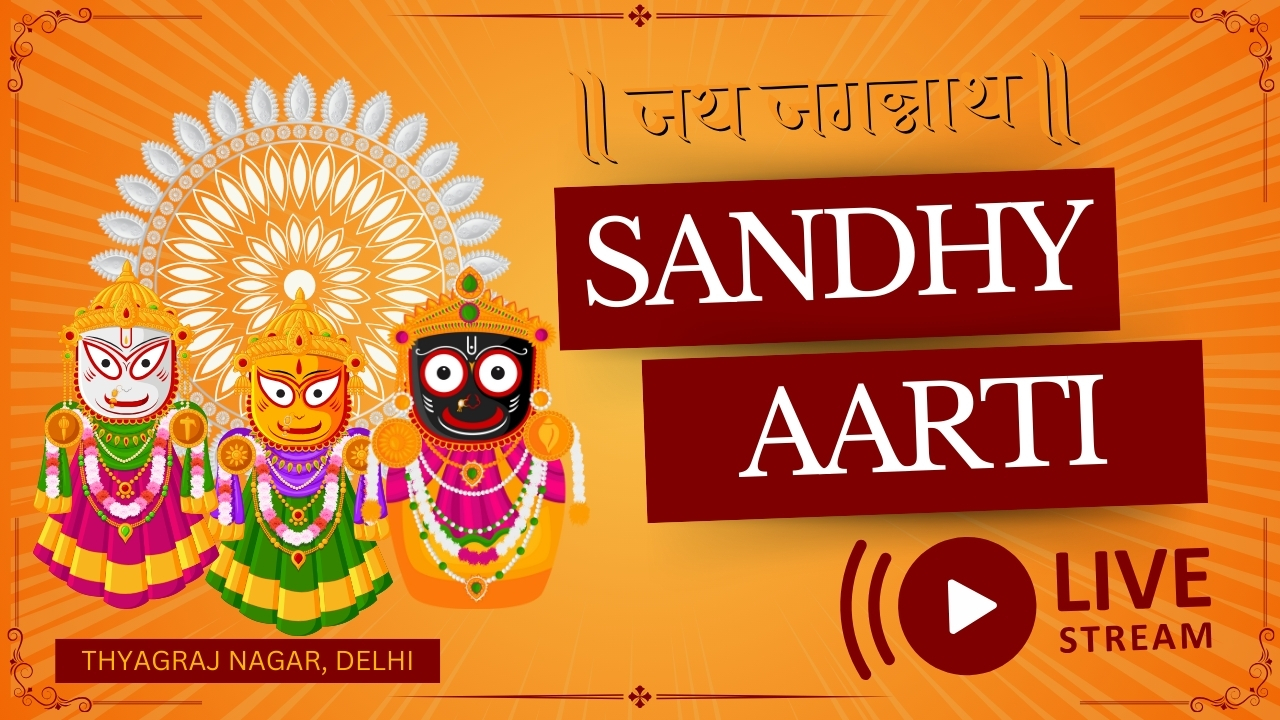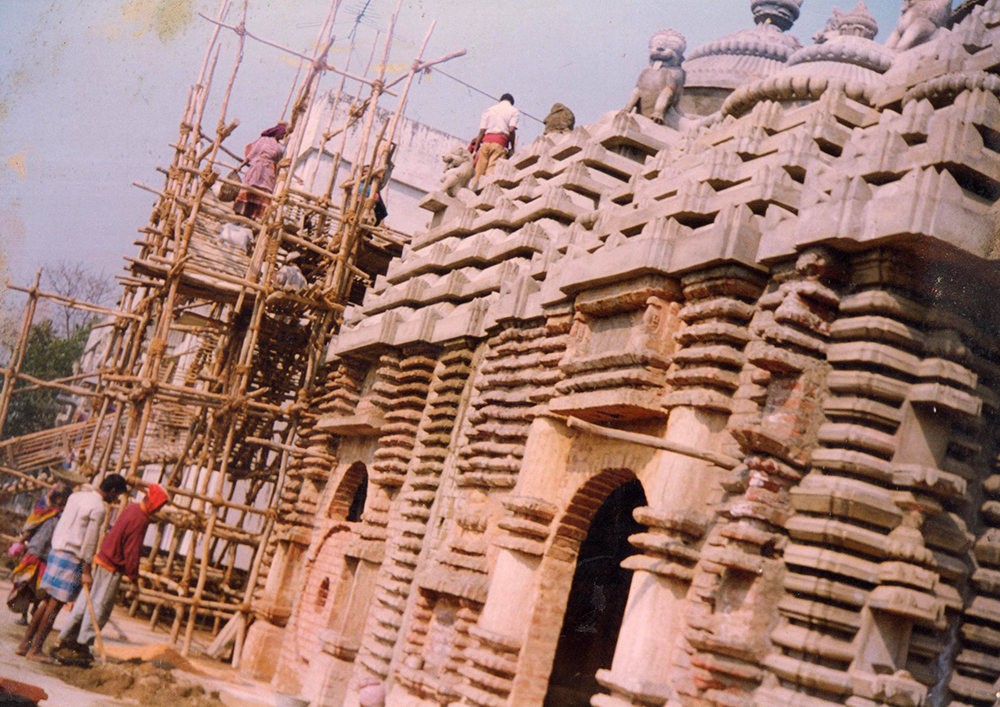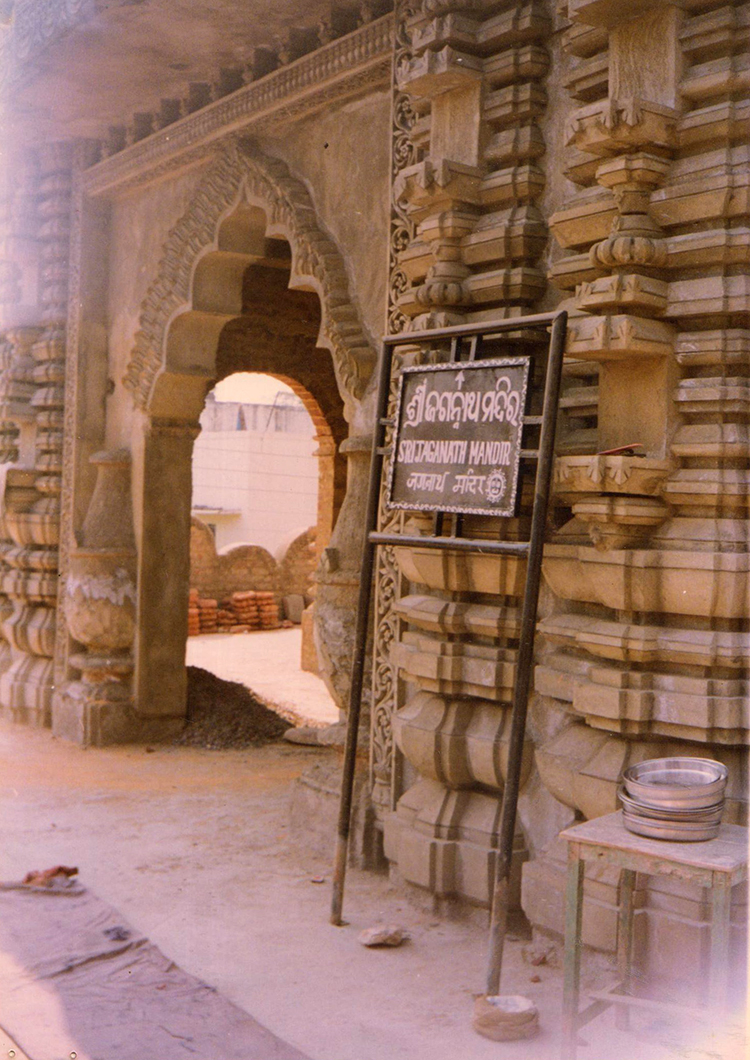August 24, 2024 12:00 am
Rekha Panchami at Jagannath Temple, Thyagaraj Nagar, Delhi
The celebration of Rekha Panchami at the Jagannath Temple in Thyagaraj Nagar, Delhi, is a significant event for the local Odia community and devotees of Lord Jagannath. This temple, dedicated to Lord Jagannath, a form of Lord Vishnu, serves as a cultural and spiritual hub for the Odia diaspora in Delhi.Rituals and Celebrations
On Rekha Panchami, the temple is beautifully decorated with flowers and traditional rangoli designs. The day begins with a special morning puja (prayer) dedicated to Lord Jagannath, followed by rituals specifically for Rekha Panchami. Devotees gather to offer prayers, seeking protection from evil and blessings for the well-being of their families, particularly their brothers. One of the unique aspects of the celebration at the Jagannath Temple is the recitation of ancient Odia hymns and mantras, which adds a deeply spiritual ambiance to the occasion. The temple priests perform the rituals with great reverence, including the symbolic worship of the snake deity, as per the traditional practices of Odisha.Community Involvement
The Rekha Panchami celebration at this temple is not just a religious event but also a cultural gathering for the Odia community in Delhi. Many families come together to participate in the rituals, and there is a sense of unity and belonging among the devotees. Women, in particular, take an active role in the rituals, offering milk, flowers, and rice to the snake deity, which is believed to bring protection and prosperity to their homes.Festive Atmosphere
The temple premises come alive with the sounds of bells, chanting, and devotional songs. Special bhajans (devotional songs) in praise of Lord Jagannath and the snake deity are sung, creating a festive and devotional atmosphere. Some years, the temple authorities organize cultural programs featuring traditional Odia dance and music, which adds to the joyous celebration.Significance in the Urban Setting
Celebrating Rekha Panchami in an urban setting like Delhi, far from the traditional heartlands of Odisha, highlights the resilience and adaptability of cultural practices. The Jagannath Temple in Thyagaraj Nagar serves as a bridge, connecting the Odia community with their roots, and festivals like Rekha Panchami help preserve and promote these rich traditions in a new environment.Preservation of Tradition
The celebration of Rekha Panchami at the Jagannath Temple in Thyagaraj Nagar, Delhi, plays a crucial role in preserving the cultural heritage of the Odia community. For many Odias living in Delhi, far from their native state, the temple serves as a reminder of their cultural roots. By observing Rekha Panchami with the same rituals and fervor as in Odisha, the community ensures that younger generations remain connected to their traditions. Parents often bring their children to the temple on Rekha Panchami, introducing them to the customs and stories associated with the festival. This helps in passing down the significance of the day, the rituals involved, and the values of respect and protection that it symbolizes. It also instills a sense of pride in their cultural identity among the younger generation.The Role of the Temple Community
The temple community, including priests and volunteers, plays a vital role in organizing the Rekha Panchami celebrations. They ensure that all the traditional rituals are followed meticulously and that the temple is prepared to accommodate the large number of devotees who attend the festival. The community’s efforts in maintaining the authenticity of the rituals help in keeping the spirit of Rekha Panchami alive in a metropolitan city like Delhi. The temple also acts as a support system for the Odia community, providing a space where people can come together, share their experiences, and offer mutual support. Festivals like Rekha Panchami become occasions for strengthening social bonds within the community.Broader Significance in the Cultural Landscape of Delhi
In a city as diverse as Delhi, the celebration of Rekha Panchami at the Jagannath Temple highlights the multicultural fabric of the metropolis. It reflects how different communities retain and celebrate their unique cultural identities while contributing to the broader cultural mosaic of the city. Such celebrations also offer an opportunity for people from other communities to learn about and appreciate the traditions of Odisha. The open and inclusive nature of the temple’s festivities often attracts curious visitors, who are welcomed and educated about the significance of Rekha Panchami, fostering a sense of understanding and cultural exchange.Rekha Panchami as a Reflection of Cultural Adaptation
The celebration of Rekha Panchami at the Jagannath Temple in Thyagaraj Nagar, Delhi, is also a testament to the adaptive nature of cultural practices. While the core rituals and beliefs remain rooted in tradition, the way the festival is celebrated in an urban setting like Delhi has evolved to fit the context of the city. For instance, in Odisha, Rekha Panchami is often celebrated in a more rural and intimate setting, with families gathering in their homes or at local temples. In contrast, the celebration at the Jagannath Temple in Delhi involves a larger community gathering, reflecting the more collective nature of life in a big city. The festival becomes a communal event, where people from various walks of life come together, sharing the experience and reinforcing their cultural identity in a bustling urban environment.Challenges and Opportunities
Maintaining the authenticity of traditional festivals like Rekha Panchami in an urban setting poses certain challenges. The fast-paced life of Delhi, along with the pressures of work and daily responsibilities, can make it difficult for people to dedicate time to religious observances. However, the Jagannath Temple and its community have successfully created an environment where these traditions can thrive. The temple provides a sanctuary where devotees can step away from the hectic pace of city life and reconnect with their spiritual and cultural roots. The efforts of the temple community to organize and promote the festival help ensure that it remains a vital part of the lives of Odia people in Delhi. Moreover, the use of social media and other digital platforms by the temple community has helped in spreading awareness and keeping the younger generation engaged.Rekha Panchami’s Broader Influence
The influence of Rekha Panchami extends beyond the Odia community. As the festival is celebrated in Delhi, it also engages people from other regions and communities, fostering a spirit of inclusivity and shared cultural experience. Visitors to the Jagannath Temple during Rekha Panchami, regardless of their background, are often touched by the devotion and the rich cultural expressions on display. This cross-cultural interaction contributes to a deeper understanding and appreciation of India’s diverse traditions. The festival becomes a platform for cultural dialogue, where people from different communities can learn from each other, thus enriching the social and cultural fabric of the city.Future Prospects
Looking ahead, the celebration of Rekha Panchami at the Jagannath Temple in Delhi is likely to continue evolving, as it adapts to the changing dynamics of the city and its inhabitants. The temple community remains committed to preserving the essence of the festival while embracing new ways to engage a broader audience. This could include more community outreach programs, educational initiatives for children, and collaborations with other cultural institutions in the city. The ongoing celebration of Rekha Panchami in Delhi serves as a powerful reminder of the resilience and adaptability of cultural traditions. As long as there is a community dedicated to keeping these traditions alive, festivals like Rekha Panchami will continue to thrive, offering spiritual nourishment and a sense of belonging to those who participate.Final Thoughts
Rekha Panchami at the Jagannath Temple in Thyagaraj Nagar, Delhi, is a living example of how cultural traditions can transcend geographical boundaries and adapt to new environments. It highlights the importance of community, the strength of cultural identity, and the enduring relevance of traditional practices in modern urban life. For the Odia community in Delhi, and for all those who partake in the festivities, Rekha Panchami is more than just a festival—it is a cherished connection to their heritage and a celebration of the enduring spirit of tradition in the heart of a cosmopolitan city.Conclusion
Rekha Panchami at the Jagannath Temple in Thyagaraj Nagar, Delhi, is more than just a religious observance; it is a celebration of cultural continuity, community solidarity, and the preservation of tradition in a rapidly changing world. The festival not only strengthens the bonds within the Odia community but also enriches the cultural diversity of Delhi, making it a meaningful event for all who participate.Rekha Panchami FAQs
What is Rekha Panchami? Rekha Panchami is a Hindu festival celebrated in India, particularly in the states of Karnataka and Maharashtra. It is observed on the fifth day of the Shukla Paksha (waxing phase of the moon) in the month of Shravan (July-August). The festival honors the serpent goddess Rekha and is associated with the worship of serpents and their protection. What are the origins of Rekha Panchami? The origins of Rekha Panchami are deeply rooted in Hindu mythology and local traditions. It is believed to be a day dedicated to appeasing serpent deities and ensuring their blessings for prosperity and protection. The specific origins may vary based on regional folklore and religious practices. How is Rekha Panchami celebrated? Rekha Panchami is celebrated with various rituals and ceremonies. Devotees perform poojas (ritualistic prayers) at serpent shrines or designated places, offer milk and other offerings to serpent idols, and recite prayers or hymns dedicated to the serpent deities. Some communities also engage in processions and traditional dances. What is the significance of serpent worship on this day? Serpent worship is significant on Rekha Panchami because serpents are considered to be powerful protectors and symbols of fertility and prosperity in Hindu mythology. The day is believed to protect individuals and their homes from negative influences and to ensure their well-being. Are there any specific rituals associated with Rekha Panchami? Yes, specific rituals for Rekha Panchami include the worship of serpent idols or images, offering milk, flowers, and other items to the deities, and performing rituals to seek protection and blessings. In some regions, people draw images of serpents on the ground and offer prayers. What should one avoid on Rekha Panchami? On Rekha Panchami, it is advisable to avoid any negative or harmful activities, such as arguments or disputes. Devotees are encouraged to maintain a peaceful and harmonious environment and to focus on positive and auspicious actions. Can anyone participate in the celebrations? Yes, anyone can participate in Rekha Panchami celebrations. It is a community-oriented festival, and individuals from all backgrounds and ages are welcome to join in the rituals and festivities. Participation often involves visiting local temples or participating in community events. Are there any specific foods associated with Rekha Panchami? While there are no strict food rituals specific to Rekha Panchami, devotees often prepare and share traditional dishes as part of the celebrations. Offering simple and vegetarian foods during the pooja is common. How does Rekha Panchami differ from other serpent festivals? Rekha Panchami may differ from other serpent festivals in terms of regional practices and specific rituals. While many festivals honor serpent deities, the specific customs, dates, and traditions associated with Rekha Panchami make it unique to certain regions and communities. How can one learn more about Rekha Panchami? To learn more about Rekha Panchami, you can consult local temples, religious leaders, or community elders who are knowledgeable about the festival. Additionally, researching online resources and cultural literature can provide more insights into the festival’s significance and practices.Lorem ipsum dolor sit amet, consectetur adipiscing elit. Ut elit tellus, luctus nec ullamcorper mattis, pulvinar dapibus leo.
Lorem ipsum dolor sit amet, consectetur adipiscing elit. Ut elit tellus, luctus nec ullamcorper mattis, pulvinar dapibus leo.


